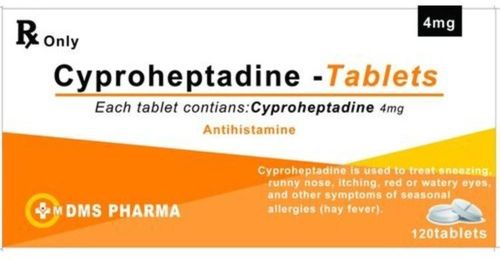This is an automatically translated article.
Cyproheptadine 4mg is an antiallergic drug and is used in cases of hypersensitivity. The following article provides you with information about the uses, dosage and precautions when using Cyproheptadine.
1. What is Cyproheptadine?
Cyproheptadine is an antihistamine. Cyproheptadine can be prepared in the form of tablets with a strength of 4mg, a syrup with a strength of 2mg/5ml, 0.4mg/ml.
Cyproheptadine has an antagonistic effect on histamine, serotonin, besides Cyproheptadine also has a sedative effect. Cyproheptadine antagonizes histamine and serotonin by competing with free histamine and serotonin for binding at their respective receptors. Serotonin antagonism at the hypothalamic appetite control region explains cyproheptadine's ability to stimulate appetite.
2. Indications and contraindications of Cyproheptadine 4mg
2.1 Indications Indications to use Cyproheptadine 4mg in the following cases:
Perennial allergic rhinitis, seasonal allergic rhinitis. Vasomotor rhinitis. Allergic conjunctivitis caused by allergens and foods. Uncomplicated mild skin allergy. Improves allergic reactions to blood or plasma. Urticaria due to cold. Venereal diseases. Vascular migraine (histamine migraine, migraine). Cyproheptadine is the treatment of anaphylaxis, adjunctive to epinephrine and other standard measures after the acute manifestation of anaphylaxis has been controlled. Stimulating appetite. 2.2 Contraindications Cyproheptadine is contraindicated in the following cases:
Allergy or hypersensitivity to Cyproheptadine or other drugs with similar chemical structure. Newborns, premature babies. Women are breastfeeding. Elderly, debilitated patient. Currently being treated with a monoamine oxidase inhibitor. Angle-closure glaucoma. Peptic ulcer disease. Symptomatic prostate enlargement. Bladder neck obstruction. Duodenal obstruction.
3. How to take Cyproheptadine 4mg
3.1 How to take the drug Cyproheptadine is taken orally. Dosage is as follows:
Adults
Allergy treatment: starting dose 4mg x 3 times/day; Adjust dose based on patient size and response as needed, up to a maximum of 0.5 mg kg daily. The usual dose is 4-20mg/day, most patients use 12-16mg/day. In some cases, patients may need up to 32mg per day. Chronic urticaria: 1⁄2 tablets x 3 times/day. Acute migraine: take 1 tablet, if after 30 minutes there is still a headache, you can take another 1 tablet. Taking 1 Cyproheptadine 4mg tablet every 4 to 6 hours is usually sufficient to avoid recurrent headaches. The total dose of Cyproheptadine should not exceed 8mg in 4-6 hours. Anorexic: the initial dose is 1⁄2 tablets x 4 times/day, gradually increasing over a period of 3 weeks to 8mg x 4 times/day. Children
Do not give Cyproheptadine to children under 2 years of age.
Allergic status:
Children from 2 to 6 years old: usual dose 1⁄2 tablets/time x 2 - 3 times/day; Adjust dose based on patient size and response, maximum dose is 12 mg/day. Children from 7-14 years old: usual dose 1 tablet/time x 2-3 times/day; Adjust dose based on patient size and response, maximum dose 16mg/day. Adolescents ≥15 years old: starting dose 4mg/time x 3 times/day; Adjust dose to size and patient response, up to a maximum of 0.5 mg/kg daily. Dosage: 4 - 20mg/day; Most patients need 12-16mg/day. Anorexia children: Adolescents ≥13 years old: dose 2mg x 4 times/day, dose gradually increased over 3 weeks to 8mg x 4 times/day. 3.2 Overdosage of Cyproheptadine 4mg and Management pupils, digestive disorders.
Treatment in case of overdose with Cyproheptadine can use ipeca syrup to induce vomiting, gastric lavage and activated charcoal. Besides, applying supportive measures such as using vasopressors to treat hypotension or when CNS symptoms appear, hysostigmine salicylate can be administered intravenously.
3.3 Missed dose of Cyproheptadine 4mg and treatment If you forget to take a dose of Cyproheptadine, take it as soon as possible. If it is almost time for the next dose of Cyproheptadine, skip the missed dose and take the next dose as scheduled. Also, do not double the prescribed dose of Cyproheptadine.
4. Some notes when using Cyproheptadine 4mg
In the process of using Cyproheptadine 4mg, patients should pay attention to some of the following:Using Cyproheptadine in pediatric patients: Overuse of antihistamines, especially in infants and young children, has can cause central nervous system depression, hallucinations, convulsions, respiratory arrest and even death. The antihistamine Cyproheptadine may decrease alertness, conversely in young children, may produce irritation. Concomitant use of antihistamines with alcohol, other CNS depressants such as tranquilizers, hypnotics, anti-anxiety drugs may increase the adverse effects of the drug on the central nervous system. Patients should pay attention not to use alcoholic beverages while taking Cyproheptadine. Elderly patients: Antihistamines may cause sedation, dizziness and hypotension. Cyproheptadine has atropine-like effects, so it should be used with caution in patients with a history of bronchial asthma, glaucoma, hyperthyroidism, cardiovascular disease, or hypertension. Pregnancy: Cyproheptadine should only be used during pregnancy when clearly needed. Lactation: Antihistamines are contraindicated in lactating women due to the risk of antihistamines to infants and premature infants. Ability to drive and use machines: especially at the beginning of treatment, Cyproheptadine may cause dizziness, drowsiness, lightheadedness. Therefore, patients should not drive or operate machinery when experiencing these side effects.
5. Undesirable effects when using the drug Cyproheptadine
During the use of Cyproheptadine, there are often side effects such as drowsiness and somnolence. This side effect is usually transient and disappears after the first 3-4 days of treatment and rarely requires discontinuation of Cyproheptadine. Some other possible side effects such as:
Nervous system: convulsions, restlessness, dizziness, headache, neuritis, paresthesia, sedation, tremor, confusion, excitement, excitation, hallucinations, coordination disorder, hysteria, insomnia, irritability, nervousness. Digestive system: nausea, vomiting, dry mouth, constipation, diarrhea, epigastric pain. Kidney, urinary: difficulty urinating, urinary retention or urge to urinate. Respiratory: dry nose and throat, stuffy nose, wheezing, shortness of breath, nosebleeds, thick bronchial secretions. Hepatobiliary disorders: hepatitis, jaundice, cholestasis, liver failure, abnormal liver function. Eyes: blurred vision, accommodation disorder, double vision. Skin and subcutaneous tissue: allergic rash, urticaria, profuse sweating, photosensitivity. extrasystole, hypotension, palpitations, tachycardia, Hematology: hemolytic anemia, agranulocytosis, leukopenia, thrombocytopenia. Metabolism and nutrition: anorexia, increased appetite, weight gain.
6. Drug interactions
Central nervous system depressants such as sleeping pills, alcohol, tranquilizers used concurrently with Cyproheptadine increases the risk of CNS depression. Fluoxetine: when used concurrently with Cyproheptadine reverse the antidepressant effect of the drug. MAO inhibitors: prolong and enhance the anticholinergic effects of cyproheptadine. Alcohol: may increase the sedative effect of Cyproheptadine. Cyproheptadine is an antihistamine used in cases of allergies, urticaria, and rashes. To ensure the effectiveness of treatment and avoid unwanted side effects, patients need to strictly follow the instructions of the doctor, professional pharmacist.
Follow Vinmec International General Hospital website to get more health, nutrition and beauty information to protect the health of yourself and your loved ones in your family.
Please dial HOTLINE for more information or register for an appointment HERE. Download MyVinmec app to make appointments faster and to manage your bookings easily.













